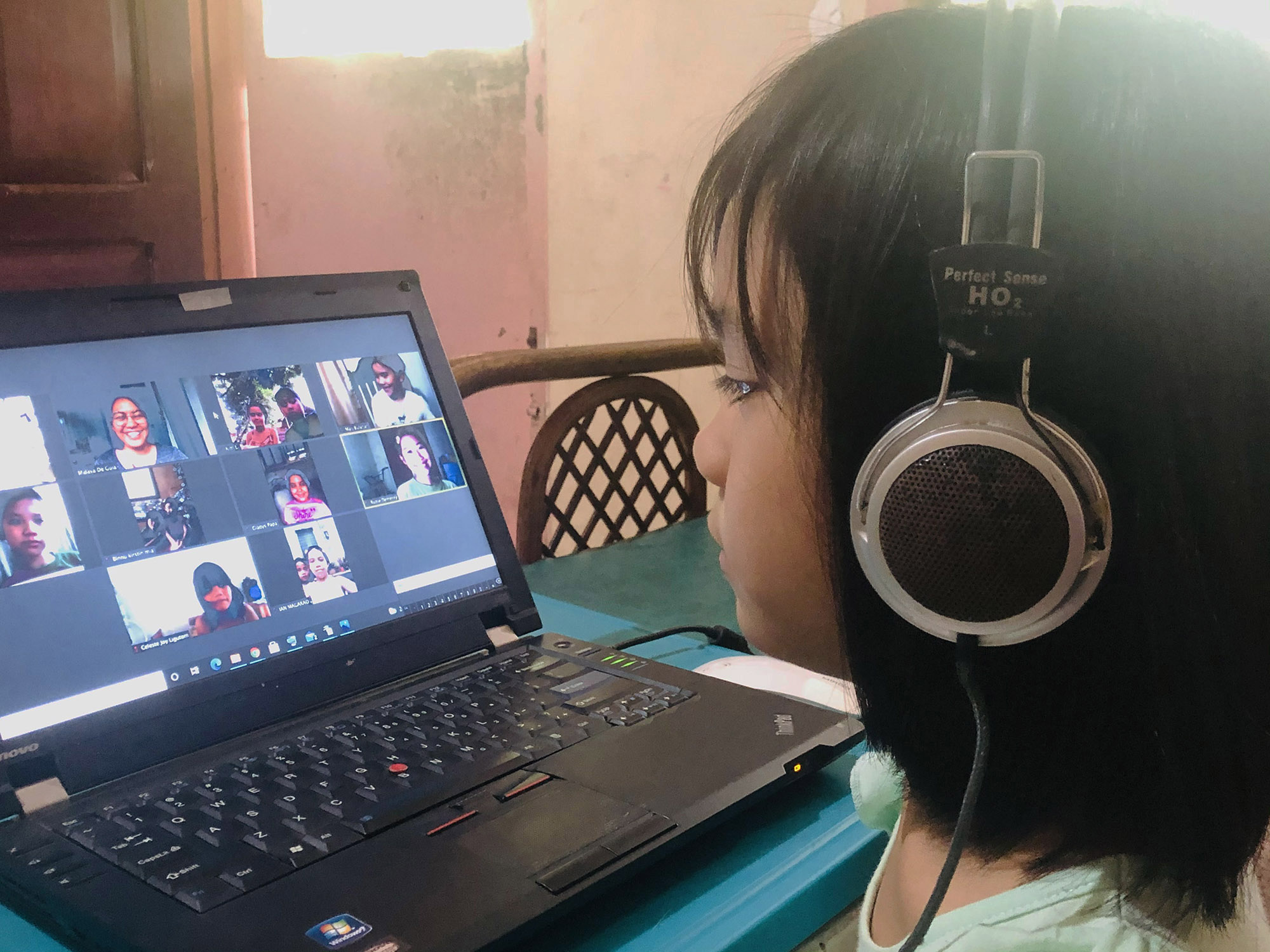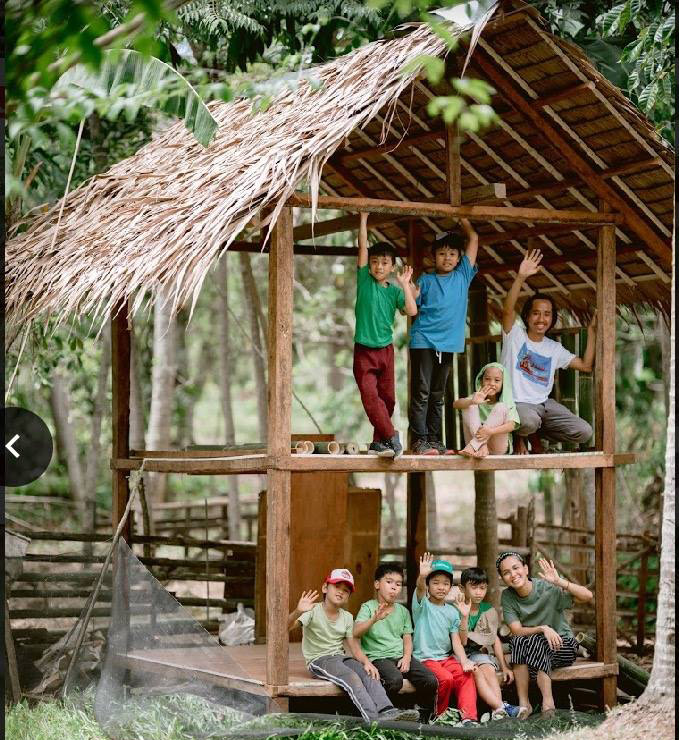DAVAO CITY (MindaNews / 4 October) — Before the coronavirus disease 2019 (COVID-19) pandemic reared its ugly head last year and prevented students from attending face-to-face classes, children running around open fields, climbing up and down tall trees, and singing and dancing were the usual scenes that unfolded at the Tuburan Institute, Inc., the only Steiner Waldorf School in Mindanao.
Tuburan Institute prides itself to be a nature school that follows the Steiner ethos, which is to provide an unhurried and creative learning environment where children can find the joy in learning and experience the richness of childhood rather than early exposure to academic hot-housing.
At the institute, gadget and media exposure are withheld until the students are in the eighth or ninth grades. This approach is being applied by Steiner Waldorf Schools all over the world.
In March 2020, all the schools in Davao City were put to a halt due to the community lockdowns implemented by the local governments. In two weeks’ time, many private schools shifted to online setup as more restrictions were further implemented to counter the COVID-19 pandemic.
 A student of the Tuburan Institute, Inc. attends online classes. MindaNews photo by JOAN MAE SOCO-BANTAYAN
A student of the Tuburan Institute, Inc. attends online classes. MindaNews photo by JOAN MAE SOCO-BANTAYAN
Schooling continues
The Tuburan school grounds in Tugbok District, which used to be filled with giggles and voices of students playing with their classmates and, many times, with their teachers, suddenly became empty and totally quiet. In the next few months, weeds and tall grasses grew where the children used to frolic.
Last January, the Department of Education (DepEd) in Region 11 reported that 47 private schools had closed down due to low enrollment rate because of the pandemic. For the entire school year 2020 to 2021, DepEd suspended face-to-face classes and shifted the learning set-up to online or modular classes.
Tuburan experienced its share of challenges brought by the COVID-19 pandemic, including the decrease in enrollment.
“It is truly challenging for Tuburan to continue but the school community willed for the school to continue,” said Joefel Carreon, the school administrator. “The bigger challenge was how do we get creative in giving a kind of education that keeps them from feeling burned out.”
The school saw that the time of pandemic was a chance for the parents to turn their eyes towards their children, by acting as their teachers. The students’ real school teachers prepared everything and tracked the children’s progress regularly.
Balancing act for parents
Rain Sunga, a parent, said the pandemic proved to be a tough balancing act.
“Before, I would bring my child to school and go somewhere to earn our living. But during the hard lockdowns, with the work-from-home setup, I would grapple with minding my child’s schooling and my own tasks at work,” she said.
There were times when Sunga made arrangements with their neighbor who happens to be a classmate of their child so she can balance things out.
“She would look after my children while I gather the materials needed for their classes,” Sunga added.
Another parent shared how she dealt with the pandemic while working and helping her daughter in her school work.
“We earn our keep by selling food online. However, there were challenging days when I wouldn’t know what to mind first anymore – the ladle and the pan or the pen and notebook of my child,” she said.
“Nevertheless, we made it last year and I also learned how my child is faring. I wish for my child to be happy as she learns Math or any subject for that matter,” she added.
Another Grade 6 parent lamented that the pandemic robbed their children from playing outdoors at the school grounds.
“They are so active in school. They sweat a lot when they run and chase their playmates but during the pandemic, their play has been sacrificed to a large extent as they had to stay indoors,” the parent said.
While they have a little space in their front yard, the parent felt sorry for those children who live in small spaces without lawns.
 Grade 3 pupils of the Tuburan Institute, Inc. take part in a house building project during pre-COVID-19 pandemic times. MindaNews photo by JOHN GORRE
Grade 3 pupils of the Tuburan Institute, Inc. take part in a house building project during pre-COVID-19 pandemic times. MindaNews photo by JOHN GORRE
On the other hand, some teachers expressed sadness upon hearing their students tell them how lonely it is to not see their classmates for a long time.
“When a child tells you, ‘Teacher, I wish I can run and play with my classmates again,’ you can’t help but ask yourself how you can make it better for these children,” said Malaya De Guia, a Grade 3 teacher.
Shift to online
After a year of distance learning, the school assessed the whole process and methods employed to make life easier for students, parents and teachers.
“We saw how the parents have so much difficulty delivering the lessons and making a living at the same time. And the teachers also wish to be in touch regularly with their pupils,” Carreon said.
“Admittedly, we have a bias for human connection. The warmth is different when people meet personally. But with external circumstances as a deciding factor, we also know that, with creativity, we can foster warm connections even when we are just meeting online. The challenge is how do we spark joy in us and in our children now that we are interacting with gadgets instead of humans,” the school administrator added.
Longer pauses, more frequent water and pee breaks, a bigger allowance for humor, more patience with connectivity issues and mindfulness concerning the attention span of children and adults are among the many considerations that have to be placed to the fore with the online shift.
“We have to keep in mind that the attention span of an adult is actually only 15 minutes maximum, so how can we expect the children to focus longer than we can?” Sven Saar, a Tuburan mentor, reminded the teachers in one of their online training sessions.
Apart yet in touch
As another school year is starting, Tuburan is now looking at a mix of online and offline learning scheme. Innovations and localization of lessons are being prioritized for the classes. Despite the current setup, the school community continues to gather online for continuous learning not just for the children but for adults too.
“Our good thoughts for our colleagues, the community and the children will carry us in these challenging times. We can no longer just say we did what we could. Now it’s time to maximize the available resources that we have for the school to continue serving the children,” Carreon said.
“With the choice to use online and offline learning this year, as long as we place the children at the heart of it, there are countless ways to give our lessons to them in a way that (will give them a holistic education),” said Grade 6 teacher Vivian Tambis. (Joan Mae Soco-Bantayan for MindaNews)
